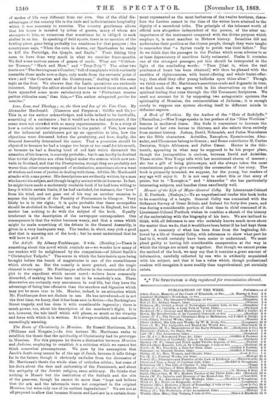The Roots of Christianity in Mosaism. By Russell Martineau, M.A.
(Williams and Norgate.)—In this lecture Mr. Martineau seeks to establish the thesis that the spirituality of Christianity had its prototype in Mosaism. For this purpose he draws a distinction between Mosaism and Judaism, employing to establish it a criticism which we cannot but think somewhat presumptuous. We pass by the assumption that Jacob's death-song cannot be of the age of Jacob, because it tells things far in the future, though it obviously excludes from the discussion of Mr. Martineau's thesis the whole class of orthodox critics; but some of his dicta about the date and authorship of the Pentateuch, and about the antiquity of the Jewish religion, seem arbitrary. He thinks that nothing is Mosaic but the institution of the Sabbath and the rite of the passover, though he cannot do more than "hope and believe that the ark and the tabernacle were not comprised in the original Mosaism, but were only one of its earliest degradations." We are not at all prepared to allow that because Simeon and Levi are in a certain docu- ment represented as the most barbarous of the twelve brethren, there- fore the Levites cannot in the time of the writer have attained to the dignity of a sacerdotal tribe. The principle of the inherent worth of official acts altogether independent of the person, of the utter un- importance of the instrument compared with the divine purpose which employs it, is most manifest in Hebrew history. Israelites did not undervalue their position as the chosen people, though they were taught to remember that "a Syrian ready to perish was their father." Nor do we think that the passages in the Psalms which seem adverse to or at least depreciatory of sacrifices fairly estimated. Psalm Ii. contains. one of the strongest passages, yet this should be interpreted in the light of the concluding words : "Then [that is, when the real penitence of heart has been obtained] wilt thou be pleased with the sacrifice of righteousness, with burnt-offering and whole burnt-offer- ing; then shall they offer young bullocks upon thine altar." Though we think some of Mr. Martineau's assertions crude and dogmatic in tone, we find much that we agree with in his observations on the line of spiritual feeling that runs through the Old Testament Scriptures. We not account for it by supposing two antagonistic systems, the spirituality of Mosaism, the ceremonialism of Judaism ; it is enough surely to suppose one system showing itself to different minds in different aspects.


































 Previous page
Previous page